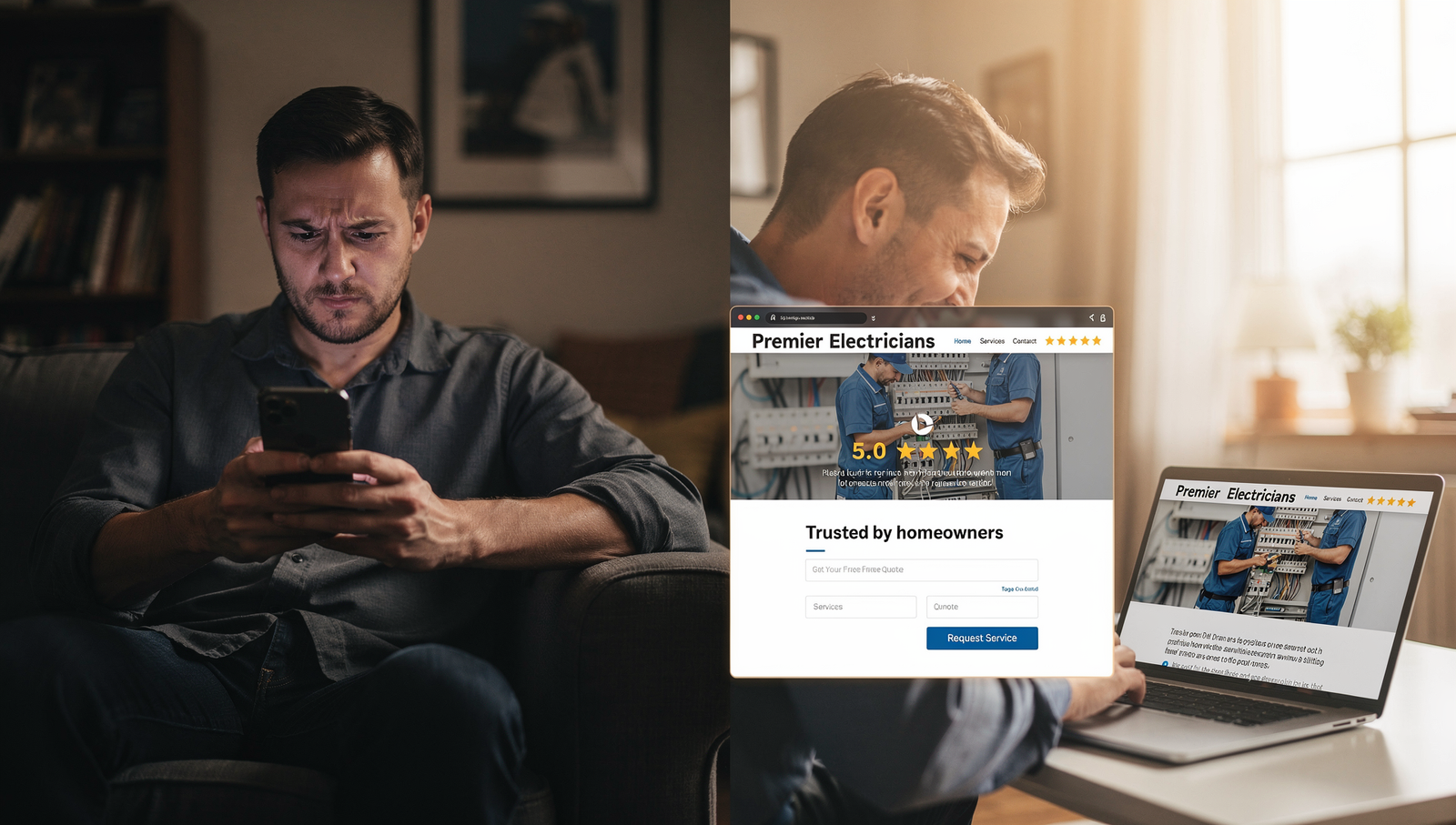How to Do a ZIP Code Market Analysis That Wins Listings
One agent we work with used this ZIP code market analysis approach in a listing appointment and beat out two competitors charging lower commissions.

Want More Clients Fast?
Steal This Website Rescue Kit to Get More Clients, More Calls, and More Sales on Autopilot
If you want to stand out as the go-to agent in your community, mastering a real estate market analysis for single family homes in your ZIP code is non-negotiable. Buyers and sellers crave data that proves you know your market inside and out. The best part? Creating one is simpler than most agents realize, and once you know how, you can use it to generate trust, leads, and repeat business.
Real Estate Market Analysis for Single Family Homes: Where to Start
A strong market analysis begins with data collection. Focus specifically on single-family homes within your target ZIP code to keep your analysis accurate and relevant. The narrower your focus, the more valuable your insights become.
Here’s what you’ll need to gather:
Recent sales data (last 3–6 months)
Active listings that match the property type
Pending transactions for insight on demand
Average days on market (DOM)
Price per square foot trends
Pro Tip: Using tools from our guide to the Best Free Tools for Realtors makes gathering this information much faster.
Analyze Comparable Sales (Comps)
The backbone of any market analysis is comparables. Choose homes that are:
Within one mile of the subject property
Similar in size, age, and condition
Sold within the last six months
Example: Let’s say a 2,400-square-foot home in ZIP 75035 sold for $465,000 in June. If you have three similar comps in the same ZIP that average $470,000, your analysis shows the neighborhood’s pricing is stable.
By highlighting these numbers, you not only inform sellers about where to price their homes but also give buyers confidence in their offers.
Examine Current Listings and Pending Sales
Active listings show you the competition, while pending sales reveal buyer demand.
If there are too many listings but few pending sales, the market may be softening. On the other hand, if pending sales outpace actives, buyers will need to move quickly, and sellers hold leverage.
Scenario: A seller wants to list their 3-bedroom home at $500,000, but there are already ten similar homes in the same ZIP priced between $475,000–$490,000. You can use this data to gently suggest pricing at $489,000 to stay competitive.
Track Key Metrics
When presenting your real estate market analysis for single family homes, include the following key metrics:
Median Sales Price: Reveals the typical value in the ZIP code.
Price per Square Foot: Normalizes value across different property sizes.
Average DOM: Indicates how quickly homes are moving.
List-to-Sale Price Ratio: Shows how close sellers are getting to their asking price.
Inventory Levels (Months of Supply): Determines if it’s a buyer’s or seller’s market.
Buyers and sellers love clear charts and graphs here. Consider embedding visuals on your website for instant credibility (see our post on Real Estate Website Conversion Tips for ideas).
Identify Market Trends
Numbers are one thing, but interpreting them is what makes you invaluable.
Rising prices + low inventory = strong seller’s market
Stable prices + balanced inventory = neutral market
Falling prices + high DOM = buyer’s market
Add color commentary to your reports. For example: “Single-family homes in 90210 have appreciated 6 percent year-over-year, showing strong demand despite rising interest rates.”
This type of insight sets you apart from the average agent who just lists numbers.

How to Present Your Market Analysis
Once you’ve done the work, presentation is everything. Sellers and buyers aren’t looking for spreadsheets; they want clear, visual, easy-to-understand information.
Use infographics for pricing trends
Show before-and-after maps of sold properties
Break down data into simple bullet points
And here’s where your website becomes a powerful tool. A professional site allows you to host these reports as downloadable resources, driving traffic and capturing leads. (See Real Estate SEO Best Practices to learn how to make your reports rank locally on Google.)
Real-World Example: Winning a Listing
Imagine you’re pitching a listing appointment in ZIP 30339. You show up with a polished market analysis that reveals:
Median single-family home price: $420,000
Average DOM: 22 days
Inventory: 1.8 months (seller’s market)
You explain to the homeowner that pricing at $429,000 aligns with current demand. The seller immediately sees you as the market authority and trusts your recommendation. You walk out with the signed listing.
This scenario plays out over and over when you bring data-backed confidence to your conversations.
How Digital Presence Elevates Your Market Analysis
Realtors who pair market knowledge with a professional online presence always win more business. Why? Because clients see you as both trustworthy and modern.
A blog post about your local ZIP analysis boosts your SEO (see How to Rank Higher on Google Maps)
Emailing monthly analysis updates to your database builds credibility (learn more in Email Marketing for Real Estate Agents)
Using a CRM from the Top 5 Best CRMs for Realtors keeps your leads organized and ensures you never miss a follow-up
At Digital Dream Homes, we design realtor websites that make showcasing your market analysis seamless and lead-generating.
Additional Tips for Realtors
Update quarterly: Markets shift fast, and fresh data makes you look current
Hyperlocal focus: Buyers and sellers care more about their ZIP code than the broader city
Educate your audience: Use light humor and clear explanations to make stats relatable
Integrate into listing presentations: Always have your market analysis as a centerpiece
For bonus impact, consider creating short videos summarizing your findings and embedding them on your website (check out Real Estate Video Background Websites for inspiration).
Conclusion: Real Estate Market Analysis for Single Family Homes
Creating a real estate market analysis for single family homes in your ZIP code isn’t just about running numbers. It’s about turning those numbers into insights that attract sellers, win listings, and help buyers feel confident. By mastering this skill and showcasing it online, you establish yourself as the authority in your community.
Ready to take your market expertise to the next level? Book a free consultation with Digital Dream Homes today and let’s build you a luxury website that positions you as the market expert clients can’t ignore.
Matt Pieczarka
Want a Free Website Audit?
Fill out your information below and we will send you a personal screen share video of tips on how to make your actual website better!
See How Many Closings You're Losing to Zillow!
Click Here to Use our Calculator to See How Many Clients Zillow is Taking From You Per Year!
Some More Posts About Strategy and Growth…
- Marketing Plan For Small Business 2026 Every Owner Should Copy
- Benefits of Professional Website for Small Business: The Hidden Profits
- How to Get More Referrals for Small Local Business Fast
- Customer Retention Strategies Small Business Owners Never Hear About
- How Small Businesses Compete Online And Actually Win In 2026
- Blogging for Small Business Growth: 2026 Profit Multiplier
- Sales Funnel For Small Business Website That Prints Money
- What Is A Listicle And Why Your Website Desperately Needs One
- Strategic Website Design That Turns Small Business Clicks Into Clients
- The Simple Blueprint to Explosive Small Business Growth
9 Functional Medicine Website Designer Tips to Grow Faster
9 Functional Medicine Website Designer Tips to Grow Faster Watch the video to learn one psychological SEO trick to build more trust and get more leads from your website! Wan
7 Functional Medicine Website Design Moves That Get Patients
7 Functional Medicine Website Design Moves That Get Patients Watch the video to learn about the best layout to get more leads and patients guaranteed! Want More Clients Fast
11 Electrician Website Designers That Turn Clicks Into Calls
11 Electrician Website Designers That Turn Clicks Into Calls Watch the video to learn the best layout for best results! https://youtu.be/XaEbNPZxi0U?si=kT1Cru8S2SMJSPNx Want More C
11 Electrician Website Help Fixes That Turn Clicks Into Calls
11 Electrician Website Help Fixes That Turn Clicks Into Calls Watch the video to learn how to structure your website for the best return on investment! https://youtu.be/XaEbNPZxi0U
11 Electrician Web Design Company Questions to Ask
11 Electrician Web Design Company Questions to Ask Watch the video to learn the best website layout for the most lead conversions! https://youtu.be/XaEbNPZxi0U?si=SgxjOWdd7F6f4Mtg
13 Electrician Website Templates That Turn Clicks Into Paid Jobs
13 Electrician Website Templates That Turn Clicks Into Paid Jobs Watch the video to learn the best template layout for the best results! https://youtu.be/XaEbNPZxi0U?si=rGg1WlUWlmH
11 Electrician Website Services That Bring In More Calls
11 Electrician Website Services That Bring In More Calls Watch the video to learn the best website layout for the best results https://youtu.be/XaEbNPZxi0U?si=rGg1WlUWlmHTg73v Want
12 Electrician Website Upgrades That Win More Jobs
12 Electrician Website Upgrades That Win More Jobs Watch the video to learn the best website layout to get the most bang for your buck! https://youtu.be/XaEbNPZxi0U?si=uFqsnSFvenQ1
5 Electrician Website Design Company Upgrades That Win Jobs
5 Electrician Website Design Company Upgrades That Win Jobs Electrician website design that earns trust fast and drives more calls. See the must-have upgrades and book more jobs. h









